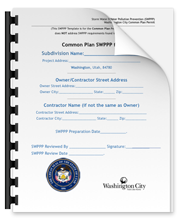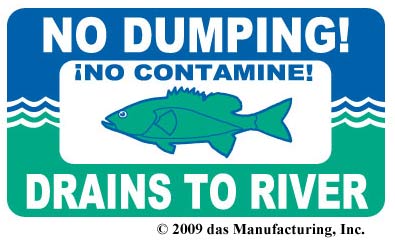Washington City Utah | (435) 656-6300
letusknow@washingtoncity.org
111 North 100 East | Washington, Utah 84780 [map]
© 2025 Washington City Corporation. All rights reserved.
Privacy Policy
Public Works Department - Storm Water
Education:
To learn more about what you can do to prevent water pollution, stormwater violations or learn about other public education outreach opportunities, please contact Ross Romero; Stormwater Coordinator, at (435) 656-6317 or stormwater@washingtoncity.org
Public Input on the Stormwater Program:
To provide public input on the Washington City Stormwater Program, please contact Ross Romero, Stormwater Coordinator at either (435) 656-6317 or stormwater@washingtoncity.org
Illicit Discharges or Spills:
If you witness or encounter any illicit discharge or spill on the roadway, near any storm drain inlet, channel, or basin, or near the Virgin River, please report it immediately by calling (435)656-6317 (Monday - Friday 7am to 4pm) or after hours by calling Washington County Dispatch at (435)634-5730.
Stormwater Ordinances and Documents:
- Washington City Grading Manual Ordinance (pdf)
- Washington City Grading Manual (pdf)
- Best Management Practices Standard Notes and Details (pdf)
- Illicit Discharge and Stormwater Ordinance (pdf)
- Post Construction Stormwater Ordinance (pdf)
- Resolution LID Manual (pdf)

Stormwater Permit Information
Clean Water Is Important To All Of Us
It's up to all of us to make it happen. In recent years, sources of water pollution like industrial wastes from factories have been greatly reduced. Now more than 60 percent of water pollution comes from things like cars leaking oil, fertilizers from farms and gardens and failing septic tanks. All these sources add up to a big pollution problem. But each of us can do small things to help clean up our water too-and that adds up to a pollution solution!
Why do we need clean water?
Having clean water is of primary importance for our health and economy. Clean water provides recreation, commercial opportunities, fish habitat, drinking water and adds beauty to our landscape. All of us benefit from clean water, and all of us have a role in getting and keeping our lakes, rivers, marine and ground waters clean.

Watch for this label to identify Storm drains in the City.
What's the problem with motor oil?
When your car is leaking oil on the street, remember it isn't just leaking oil on the street.
Oil does not dissolve in water. It lasts a long time and sticks to everything from beach sand to bird feathers. Oil and other petroleum products are toxic to people, wildlife and plants. One pint of oil can make a slick larger than a football field. Oil that leaks from our cars onto roads and driveways is washed into storm drains, and then usually flows directly to a lake or stream. Used motor oil is the largest single source of oil pollution in our lakes, streams and rivers. Americans spill 180 million gallons of used oil each year into our waters. This is 16 times the amount spilled by the Exxon Valdez in Alaska.
Clean Water Tip:
How can you use and change your motor oil and help keep our waters clean?
- Stop drips. Check for oil leaks regularly and fix them promptly. Keep your car tuned to reduce oil use.
- Use ground cloths or drip pans beneath your vehicle if you have leaks or are doing engine work. Clean up spills immediately. Collect all used oil in containers with tight fitting lids. Do not mix different engine fluids.
- Never dispose of oil or other engine fluids down the storm drain, on the ground or into a ditch.
- Recycle used motor oil. Many auto supply stores and gas stations will accept used oil. Buy recycled (re-refined) motor oil to use in your car.
Local Recycle Drop Off Sites:
Jiffy Lube
WalMart
Auto Zone
Paxman Automotive
Recycle Antifreeze at:
St George Muffler & Radiator
(no oil in antifreeze)
Monday-Friday 8am-5pm
(435)673-2948
28 N 700 E, St George
What's the problem with pet waste?
It's a health risk to pets and people, especially children. It's a nuisance in our neighborhoods. Pet waste is full of bacteria that can make people sick. If it's washed into the storm drain and ends up in a lake, stream or marine water, the bacteria end up in shellfish. People who eat those shellfish can get very sick. The waste produced by Seattle's dogs and cats is about what a city the size of Renton or Kennewick (about 50,000 people) would produce. Unless people take care of it, the waste enters our water with no treatment.
When your dog goes on the lawn, remember, you're dog isn't just going on the lawn.
Clean Water Tip:
How can you get rid of pet waste and help keep our waters clean? Here are some options:
- Scoop it up and flush it down the toilet. That's best because then your community sewage treatment plant or your septic system treats the pet waste.
- Seal the waste in a plastic bag and throw it in the garbage. (This is legal in most areas, but check local laws.)
- Bury small quantities in your yard where it can decompose slowly. Dig a hole one foot deep. Put three to four inches of waste at the bottom of the hole. Cover the waste with at least eight inches of soil. Bury the waste in several different locations in your yard and keep it away from vegetable gardens.
What's the problem with car washing?
There's no problem with washing your car. It's just how and where you do it. Most soap contains phosphates and other chemicals that harm fish and water quality. The soap, together with the dirt and oil washed from your car, flows into nearby storm drains which run directly into lakes, rivers or marine waters. The phosphates from the soap can cause excess algae to grow. Algae look bad, smell bad, and harms water quality. As algae decay, the process uses up oxygen in the water that fish need.
Remember: When you're washing your car in the driveway, you're not just washing your car in the driveway.
Clean Water Tip:
How can you wash your car and help keep our waters clean?
- Use soap sparingly. Use a hose nozzle with a trigger to save water.
- Pour your bucket of soapy water down the sink when you're done, not in the street.
- Wash your car on a grassy area so the ground can filter the water naturally.
An even better idea, take your car to a commercial car wash, especially if you plan to clean the engine or the bottom of your car. Most car washes reuse wash water several times before sending it to the sewer system for treatment.
To find out more about the impacts from washing your vehicle and what you can do to prevent water pollution, call the Stormwater Department at 656-6317.
What's the problem with fertilizer?
When you treat the lawn, remember, you're not just treating your lawn.
Fertilizer isn't a problem if it's used carefully. If you use too much fertilizer or apply it at the wrong time, it can easily wash off your lawn or garden into storm drains and then flow untreated into lakes or streams. Just like in your garden, fertilizer in lakes and streams makes plants grow. In water bodies, extra fertilizer can mean extra algae and aquatic plant growth. Too much algae harms water quality and makes boating, fishing and swimming unpleasant. As algae decay, they use up oxygen in the water that fish and other wildlife need.
Clean Water Tip:
How can you fertilize and help keep our waters clean?
- Use fertilizers sparingly. Many plants do not need as much fertilizer or need it as often as you might think.
- Don't fertilize before a rainstorm.
- Consider using organic fertilizers - they release nutrients more slowly.
- Use commercially available compost or make your own using garden waste. Mixing compost with your soil means your plants will need less chemical fertilizer and puts your waste to good use. Commercial compost and soil amendments may be available from your solid waste or wastewater utility as well as your local garden store.
For more information on fertilizing alternatives and composting call your County Extension's Master Gardeners program or the number in your community listed below.
Downloadable Information and Materials:
- Storm Water Capital Facilities Master Plan
- Storm Water Management Plan Document 2021-2026 (pdf)
- Virgin River Masterplan
- Virgin River Stability Study
Resources to help learn about Clean Water:
- Septic Systems Information
- EPA Kid's Puzzle - "Storm Water Runoff Challenge"
- Keep Pools & Spas from Polluting Brochure
- EPA Website for Kids & Teachers
- Washington County Solid Waste & Recycling Information
- Pools and Spa Brochure
Washington City Public Works
(435) 656-63171305 E Washington Dam Rd
Washington, Utah 84780
Hours: M-F 7a-4p







Latest on Instagram: